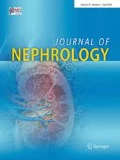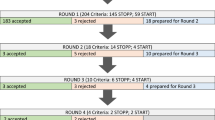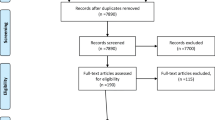Abstract
Background
A growing number of elderly patients with end-stage renal disease start dialysis. We examined elderly (≥65 years) patients’ views about their decision-making experience after starting dialysis in comparison with patients aged 50–64 years, and patients ≤49 years.
Methods
Ninety-nine patients from 15 outpatient dialysis centers in North Carolina, USA completed a semi-structured interview asking them about the context of decision-making and their decision-making experience, and a 10-item investigator-developed Informed Decision-Making (IDM) questionnaire with binary response options (yes/no).
Results
While IDM scores were low for all three groups (<5 out of 10), they were significantly lower for the older group compared to the other two younger groups (p = 0.02). A significantly lower percentage of the older group said that the doctor explained underlying conditions that led to kidney failure (p = 0.04), the impact of dialysis on daily life (p = 0.04), and the life-long need for dialysis (p < 0.01), and that the doctor tried to make sure the patient understood the information (p = 0.01). Also a significantly higher percentage of elderly patients felt the decision was made by the doctor rather than on their own or with their family, or collaboratively with the doctor (p = 0.04).
Conclusions
Informed decision-making is significantly poorer in patients aged 65 years or older than in younger patients. Clinicians should communicate clearly about the benefits and burdens of dialysis to older adults and provide an opportunity for them to understand the significant trade-offs that dialysis may require.
Similar content being viewed by others
References
U.S. Renal Data System, USRDS 2012 Annual Data Report: Atlas of End-Stage Renal Disease in the United States, 2012, National Institutes of Health, National Institute of Diabetes and Digestive and Kidney Diseases: Bethesda, MD
Kurella Tamura M, Covinsky KE, Chertow GM, Yaffe K, Landefeld CS, McCulloch CE (2009) Functional status of elderly adults before and after initiation of dialysis. N Engl J Med 361:1539–1547
Li M, Tomlinson G, Naglie G, Cook WL, Jassal SV (2008) Geriatric comorbidities, such as falls, confer an independent mortality risk to elderly dialysis patients. Nephrol Dial Transplant 23:1396–1400
Cook WL, Jassal SV (2008) Functional dependencies among the elderly on hemodialysis. Kidney Int 73:1289–1295
Renal Physicians Association (2010) Shared decision-making in the appropriate initiation of and withdrawal from dialysis: clinical practice guideline. 2nd edn. Renal Physicians Association, Rockville
Medicare Improvements for Patients and Providers Act of 2008, in Public Law 110-2752008, United States Government
Morton RL, Tong A, Howard K, Snelling P, Webster AC (2010) The views of patients and carers in treatment decision making for chronic kidney disease: systematic review and thematic synthesis of qualitative studies. BMJ 340:c112
Mehrotra R, Marsh D, Vonesh E, Peters V, Nissenson A (2005) Patient education and access of ESRD patients to renal replacement therapies beyond in-center hemodialysis. Kidney Int 68:378–390
Fadem SZ, Walker DR, Abbott G et al (2011) Satisfaction with renal replacement therapy and education: the American Association of Kidney Patients survey. Clin J Am Soc Nephrol. 6:605–612
Schell JO, Patel UD, Steinhauser KE, Ammarell N, Tulsky JA (2012) Discussions of the kidney disease trajectory by elderly patients and nephrologists: a qualitative study. Am J Kidney Dis 59:495–503
Song MK, Lin F-C, Gilet CA, Arnold RM, Bridgman JC, Ward SA (2014) Patients’ perspectives on informed decision-making surrounding dialysis initiation. Nephrol Dial Transplant 28:2815–2823
Charlson M, Szatrowski TP, Peterson J, Gold J (1994) Validation of a combined comorbidity index. J Clin Epidemiol 47:1245–1251
Pfeiffer E (1975) A short portable mental status questionnaire for the assessment of organic brain deficit in elderly patients. J Am Geriatr Soc 23:433–441
Nunnally JC, Bernstein IH (1994) Psychometric theory. McGraw-Hill, New York
Hsieh HF, Shannon SE (2005) Three approaches to qualitative content analysis. Qual Health Res 15:1277–1288
Marks DF, Yardley L (2004) Research methods for clinical and health psychology. SAGE, Thousand Oaks
Onwuegbuzie AJ, Teddlie C (2003) A framework for analyzing data in mixed methods research. In: Teddlie C, Tashakkori A (eds) Handbook of mixed methods in social & behavioral research. Sage, Thousand Oaks, pp 351–383
Burla L, Knierim B, Barth J, Liewald K, Duetz M, Abel T (2008) From text to codings: intercoder reliability assessment in qualitative content analysis. Nurs Res 57:113–117
Everitt B (1996) Making sense of statistics in psychology: a second-level course. Oxford University Press, Oxford
Badzek LA, Cline HS, Moss AH, Hines SC (2000) Inappropriate use of dialysis for some elderly patients: nephrology nurses’ perceptions and concerns. Nephrol Nurs J 27:462–470
Winkelmayer WC, Kurella Tamura M (2012) Predialysis nephrology care of older individuals approaching end-stage renal disease. Semin Dial 25:628–632
Russ AJ, Shim JK, Kaufman SR (2005) “Is there life on dialysis?”: time and aging in a clinically sustained existence. Med Anthropol 24:297–324
Russ AJ, Shim JK, Kaufman SR (2007) The value of “life at any cost”: talk about stopping kidney dialysis. Soc Sci Med 64:2236–2247
Keyes KM, Utz RL, Robinson W, Li G (2010) What is a cohort effect? Comparison of three statistical methods for modeling cohort effects in obesity prevalence in the United States, 1971–2006. Soc Sci Med 70:1100–1108
Stevens LA, Viswanathan G, Weiner DE (2010) Chronic kidney disease and end-stage renal disease in the elderly population: current prevalence, future projections, and clinical significance. Adv Chronic Kidney Dis 17:293–301
Post JB, Jegede AB, Morin K, Spungen AM, Langhoff E, Sano M (2010) Cognitive profile of chronic kidney disease and hemodialysis patients without dementia. Nephron Clin Pract 116:c247–c255
Tsai CF, Wang SJ, Fuh JL (2010) Moderate chronic kidney disease is associated with reduced cognitive performance in midlife women. Kidney Int 78:605–610
James BD, Boyle PA, Bennett JS, Bennett DA (2012) The impact of health and financial literacy on decision making in community-based older adults. Gerontology 58:531–539
Marks R (2009) Ethics and patient education: health literacy and cultural dilemmas. Health Promot Pract 10:328–332
Acknowledgments
This study was funded by the National Institutes of Health, the Office of the Director (R01NR011464-03S1, Song). The sponsor had no role in the design, methods, subject recruitment, data analysis, and preparation of the paper.
Conflict of interest
No authors have conflict of interest or financial relationships to disclose.
Author information
Authors and Affiliations
Corresponding author
Rights and permissions
About this article
Cite this article
Song, MK., Ward, S.E. The extent of informed decision-making about starting dialysis: does patients’ age matter?. J Nephrol 27, 571–576 (2014). https://doi.org/10.1007/s40620-014-0061-4
Received:
Accepted:
Published:
Issue Date:
DOI: https://doi.org/10.1007/s40620-014-0061-4




